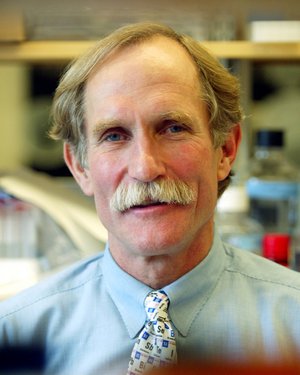Research Lab Results
-
Peter Agre Lab
Work in the Peter Agre Lab focuses on the molecular makeup of human diseases, particularly malaria, hemolytic anemias and blood group antigens. In 2003, Dr. Agre earned the Nobel Prize in Chemistry for discovering aquaporin water channels. Building on that discovery, our recent research has included studies on the protective role of the brain water channel AQP4 in murine cerebral malaria, as well as defective urinary-concentrating ability as a result of a complete deficiency in aquaporin-1. We also collaborate on scientific training and research efforts with 20 Baltimore-area labs and in field studies in Zambia and Zimbabwe.
-
David Sullivan Lab
Research in the David Sullivan Lab focuses on malaria, including its diagnosis, treatment, molecular biology as it relates to iron, and pathology as it relates to severe anemia. We test and develop new malaria diagnostics — from real-time polymerase chain reaction (PCR) to novel urine and saliva detection platforms. This includes the adaptation of immuno-PCR (antibody coupled to DNA for PCR detection) to malaria and a lead blood stage drug that contains a quinine derivative used to treat malaria in the 1930s.
-
Robert Brodsky Lab
Investigators in the Robert Brodsky Lab study normal and abnormal hematopoiesis, particularly mutations of the phosphatidylinositol glycan anchor biosynthesis class A (PIG-A) gene in aplastic anemia. Our team has developed a new diagnostic assay for paroxysmal nocturnal hemoglobinuria (PNH) that is based on the toxin Aaeromonas hydrophila.
-
Steven Frank Lab
Research in the Steven Frank Lab focuses on processes to improve blood use and to avoid blood transfusions for patients who do not want to receive blood or blood products. Processes include autologous hemodilution and cell salvage, and treating or averting anemia pre- and post-surgery. Other lab studies have focused on blood conservation, bloodless medicine surgery, the regulation of body temperature during surgery and methods of preventing hypothermia during surgery.
-
Linda Smith-Resar Lab
The Linda Smith-Resar Lab primarily investigates hematologic malignancy and molecular mechanisms that lead to cancer as well as sickle cell anemia. Recent studies suggest that education is an important and effective component of a patient blood management program and that computerized provider order entry algorithms may serve to maintain compliance with evidence-based transfusion guidelines. Another recent study indicated that colonic epithelial cells undergo metabolic reprogramming during their evolution to colorectal cancer, and the distinct metabolites could serve as diagnostic tools or potential targets in therapy or primary prevention.

